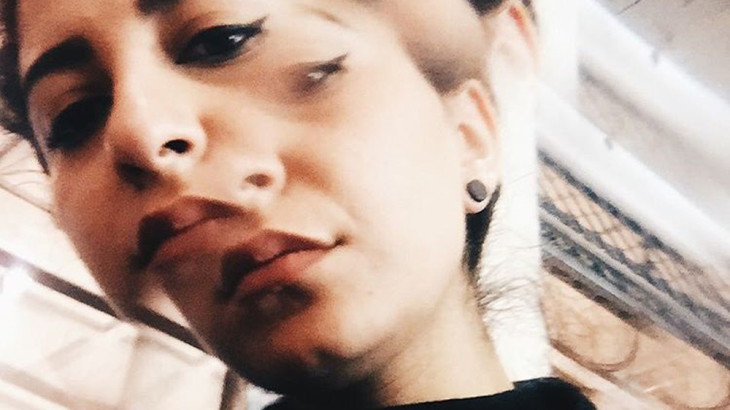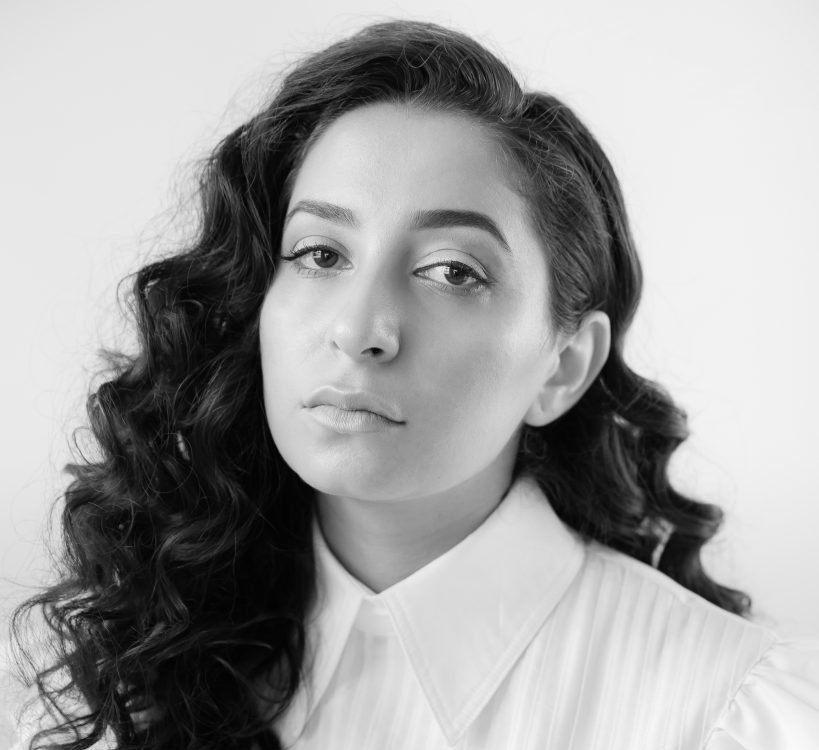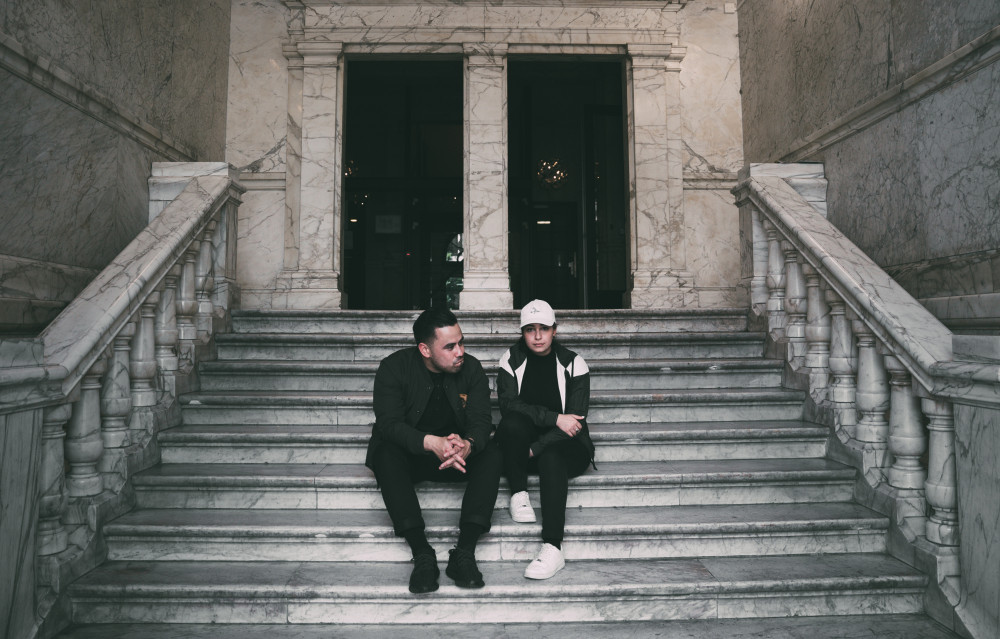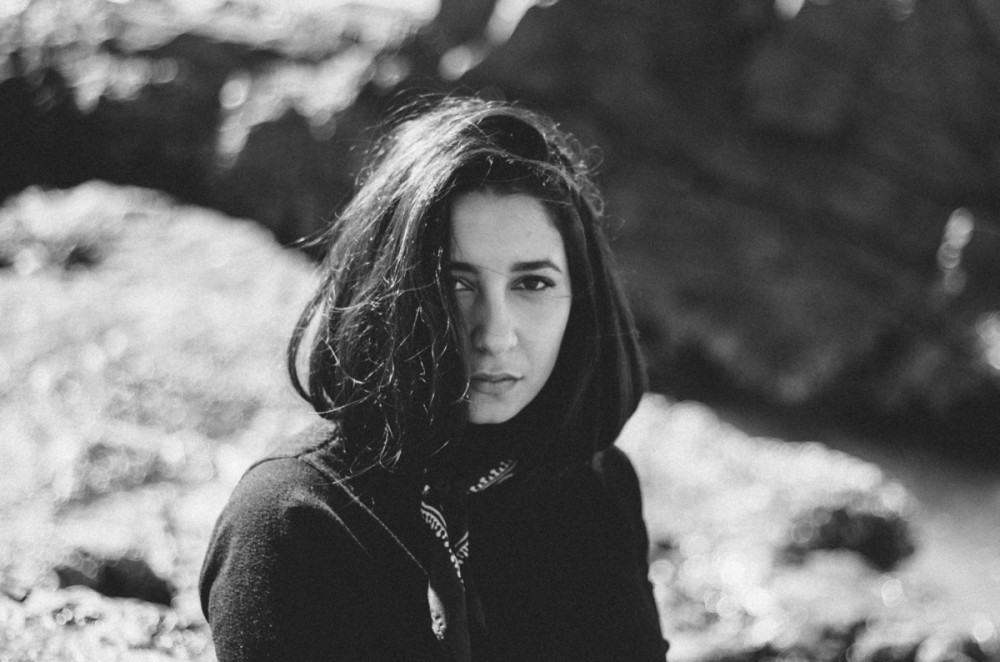23-year-old singer, songwriter and producer Wafia is undoubtedly one of the most exciting Australian artists to emerge in recent years. Known for her soothing melodies, heartfelt tones and warm buzzing beats, she conveys an intimate sincerity. Born of Middle Eastern and Dutch parents, her music channels global influences; she often writes in Arabic, not English.
Her debut EP XXIX was released in late 2015 through Future Classic, and put an honest twist on modern pop music, covering topics like racial discrimination and mental illness. Since then, she has also released another stunning project alongside label-mate Ta-ku, a frank collaborative EP which delved into family lives and how it affects each of them.
Now, Wafia is set to perform at Beyond The Valley and at St Steven’s Uniting Church for the Sydney Festival. As she inches ever closer to the release of her sophomore EP, we managed to catch up with this ever growing artist about all the intricacies of her life, both in and out of music. The Brisbane-based artist speaks with a sophistication well beyond her years, and as she guides us through her creative vision.
From an outsiders perspective, you’ve had an incerdible year. How has it been for you personally?
It’s actually really interesting, I thought this would be one of the best years, I have been doing all these things that I’ve always wanted to do. But to be completely honest with you, the thing that I thought would be stable throughout this year, my family life, wasn’t. And so, I realised, can you really enjoy the other things if you have those problems.
I try not to focus on these things as the only successes. This year has really helped me realise how important the family aspect and the support network around you is, otherwise it’s so easy to get lost in the noise of it all. I’m realising that music makes me happy, but only when it’s paired with a combination of things, if I’m personally and mentally happy, with my family and all these other things. I guess I’m really lucky to have that sort of perspective so young and early into my career.
You decided to pursue music after finishing your three-year pre-med studies. What was the turning point where you decided to make that switch?
A big part of it was my parents, my dad in particular. I think he always wanted to be an actor, but he never got the chance because his parents really pressured him into going on and studying med. So when it came time for me, I think he was kind of living vicariously through me, therefore he was just really encouraging me to do what I want to do so that I don’t regret anything later in life.
He did end up doing what he loved, he found his passion as a chef, but I think he still always has a little bit of that ‘what if’. My mum on the other hand got to pursue her dream, she always wanted to study English and French literature, but my dad never really did. So when it came to it, they were both really accepting. I guess if I hadn’t had them around I don’t think that I would have made the decision that I did. They were just so comfortable, and I think they were aware of my decision before I even knew of it.
For someone in my position, with the background I have, being Middle Eastern, I know that it is quite hard for young Arab girls to find themselves in music with support of parents, so I’m definitely so appreciative of that.
Has music always been your dream and passion?
I think so, but even as a young child I was a realist. I was like, ‘This isn’t going to happen…there’s such a small chance of me ever doing this’, I wanted to be a doctor and live a life where I can help people and all of that.
It was always something I wanted to do, but I didn’t know if I was capable of doing it. I used to, and still do, listen to a lot of pop music, and all those people they always just felt so manufactured to me, not that they all are, but they just seemed so considered and put together.
I didn’t have a team around me, and thought I could never do that, but then you grow up, and I think the Internet did wondrous things for those artists who just want to put themselves out there.
Reflecting back on your first project in 2012, your music could almost be described as folk. How do you reflect on that now that you are experimenting with more electronic sounds and producers?
So that EP was basically just a demo EP. Those were the first five songs I’d ever written and I just thought, ‘I’m going to put this online now,’ I didn’t really think anything of it. At the time I wasn’t entirely comfortable with myself to be completely honest, and I think I wore my influences on my sleeve. Listening to a lot of Bon Iver and Daughter at the time, I decided I wanted to make music like that.
I ended up taking that offline because, while the lyrical content was genuine, I feel the sounds weren’t. I was working with a producer and he helped me put it all together, but I wasn’t very assertive in that process, or at least as assertive as I would have liked to have been in hindsight. I wasn’t as proud of it as I believed I should have been of a body of work. It was a really tough decision for me, because I was so attached to those songs, but just not how I had presented them, which was really confusing. That was just my period of growth, and when you put things online, it just means that everyone else sees that and everyone bears witness to my growth and change.
In those early days you explained you could only write for yourself, and that anything else just didn’t share that genuine quality. Is that still the case or has your creative process changed somewhat?
That’s such an interesting question, because I’ve actually been thinking about it a lot lately. I tried to write for other people this year. On the back of Heartburn some pop artists reached out to me, and I was flown out and got to write alongside them. I just couldn’t separate myself from what I was writing. I ended up walking away, feeling like I had to keep those songs, and I felt really bad, but when I sent them the demos asking if it was okay to take them they were totally fine.
I really romanticise Sia’s trajectory, in that she wrote for other people and totally killed it in that regard, but she must be so skilled to be able to detach herself. When her album This Is Acting came out, I found it really confronting. I just realised everyone is different, and I can’t be that – I can’t detach. I’m just too emotionally invested, and I can’t figure out if that’s a good thing or a bad thing in this industry. Any time someone criticises you, it’s automatically taken to heart. I’m just too close to the project and too close to my songwriting, especially because I don’t actually consider myself a songwriter. Maybe it’s imposter syndrome or something, I acknowledge I write songs, but I’m not a songwriter. Sorry it’s a bit of a tangent, just spilling my inner most thoughts to you here!
Why don’t you feel like a songwriter?
I don’t know, I mean I know I can write songs, but that title ‘songwriter’ feels so professional, and I think I’m so intimidated by that title even though it is totally what I do and I can’t ever see myself singing a song someone else has written for me. It’s really tough to explain.
What was it that then drew you to work with the likes of Thrupence, Vancouver Sleep Clinic, and Ta-ku?
Honestly, it’s that we were friends, and that we connected on a human level before it was on an artistic level, that’s what made it so easy. I think Thrupence just tweeted me. Nothing came out of it for a really long time, but then when it came time for me to decide which songs I wanted on the EP, I was listening to one of his songs at the time, and I just decided this was the guy I wanted on this project with me. We’d tried to do demos beforehand and it just didn’t work out, but when I went down there it obviously worked. The exact same thing happened with Ta-Ku. We met really randomly on some basketball court, tried to work, didn’t happen, but then something just clicked. I really appreciate that no one ever came in and tried to organise it.
As for Vancouver Sleep Clinic, he’s my neighbour. He was on tour with Daughter at the time and was just told me to come on tour with him to write a song. So we wrote it, and then the next night we were actually playing it at the St Stevens Uniting Church, which is the same place I’m playing for the Sydney festival.
I’m so lucky to do this with people that I like. There are times when management, your label, or publishing will put you in a room with people, and there will be that chemistry, but I don’t think I can ever replicate what I have with Ta-ku, Ben Abraham, Vancouver Sleep Clinic – those are my guys.
You mentioned that earlier on, you regretted not being assertive in terms of the production. How involved are you today?
I’m heavily involved. I think we went through eight different producers for Heartbreak before I was satisfied. Even then, Ta-ku sent through a bunch of ideas, and me and my mixing engineer at the time (Andrei Eremin) stripped it down just to the elements that I liked, and rebuilt it up from there. I can’t imagine not being a part of that. At the end of the day it’s my name that’s going to be on the thing, alongside the producers. I feel like I need to represent myself in all aspects. I think I’m also really obsessed with cohesion, so even though I want to have all these different producers on something, the body of work needs to flow.
Sometimes I like to put people together who you wouldn’t really expect to work together. Right now I’m really fascinated with putting pop producers with hip-hop producers, and seeing how they collaborate, while I, what I like to call, ‘backseat produce’, which means I sit on the couch and try and explain what I want. It’s easier for me to explain how I want things to feel, and then depending on how I am with the producer that will then turn into something.
In one of your earlier interviews you explained that you write “very few songs but give them everything,” does this mean there are large chunks of time spent waiting for that inspiration, or do you find yourself fine tuning songs for a long time?
I think it’s a bit of both. When I’m writing a new song I need to wait for that inspiration, but while doing so I’m also fine-tuning another song until that inspiration strikes. I find that my inspiration comes in waves; I just have to allow myself to be present and wait for it to come.
It works in two stages. If I’m going through something emotionally, sometimes I can’t write exactly how I feel because I’m just so overwhelmed. So I find myself writing notes my phone, explaining what I’m feeling, and then I try and revisit that when I’m actually trying to write a song, after I’ve processed that situation a little bit better. That way I get the heat of the moment, but still a considered song.
I’ve noticed the songs I’ve written when I’m still emotionally charged can sometimes just only make sense to me, which is fine, but they’re only songs for me. I would never put those out or anything, those are my way of dealing with it, and then from that song I write a more refined song.
So you have almost a catalogue of songs just for you, basically as therapy for yourself?
Most of the stuff I write by myself ends up being for me, or I just collect all those ideas. Then when I’m in the room with my principal co-writer Ben Abraham, I bring those up and revisit those with him.
To be honest, sometimes in sessions I become really introverted, and I get really shy presenting completely new ideas. Just to get the ball rolling I’ll throw in passages from songs I’ve written for myself, and then use that as a launching pad to get comfortable and see what the vibe is with the person I’m working with, if that’s the first time that we’ve written together.
Your big release this year was the (m)edian EP with Ta-ku. How was the creative process shifted when you were working in a studio alongside with Ta-ku?
It was really effortless, I think we were both really surprised about how quickly it all came together. I felt like each of us knew how the other worked surprisingly well, and I think at this point Reggie (Ta-ku) and I had toured twice together, so that really helped in that regard. We both just knew that we really respected each other. We also decided that we would always try to have a third person in the room with us, which is why we brought up different people. When you’re just with two people in a room, it’s so easy to get stuck and hit a wall, but if you have that third person, there’s a bit more dialogue, and a lot less internalising.
I wish it was always that way working with people. You realise doing things like that with Ta-ku, how rare that is to have that chemistry where you go in to the studio that morning, and you know by the end of the day you’re going to walk out with a song that you’re really proud of. Everything that we wrote made it onto the EP. It just felt right, it told a story and it represented both of us.
Speaking about your Sydney Festival show, what made you decide to strip it back and perform solo piano?
I wanted it to be a night about the song writing, and the people I do that with, so I’m bring out my musical director Hans, who I play all my shows with, but also Ben Abraham who I write almost all my songs with. It’s kind of a testing ground to try out all these new songs which are going to be on the EP and album, without the pressure of the production, because that part of it isn’t done yet, whereas the songwriting is.
I can’t wait to play new songs with the people I’ve been creating them with. How often do you all get to be in the same space, and have a festival that’s going to be so accommodating to you wanting to just play a solely piano show for 60+ minutes when your forte is electronic pop? I just want to push the envelope. I was raised singing in churches, so even though I’m not Christian I’ve always had this affinity towards them. I think it’s going to be a really special night, probably most because I’ll be on stage with the two people who have really helped me be where I am now.
Do you see yourself doing more of these stripped back sessions to test the water with other new works?
Totally. Like I said I’m so fortunate that Sydney festival were willing to accommodate with what I wanted. This probably wouldn’t fly in most festivals, but I really want to do more of them. I would love to just do an entire tour of churches.
Finally, do you have many plans for next year? Can we expect to be hearing a lot from you or are you going to be tinkering in the shadows?
I’ll definitely be releasing stuff next year, and I’m going to be working towards an even bigger project after that. I’m always going to be tinkering away in the shadows, but something I realised the other day is that I never want to be the loudest in the room. I’d rather be quietly achieving or just doing my thing. I’m mostly just excited to share all this new music that I’ve been working on, and hopefully do more shows with pianos and churches!
Wafia Tour Dates
Sat Dec 31: Beyond The Valley, VIC
Fri Jan 27: St Stephen’s Uniting Church, Sydney (Sydney Festival)
Image: Instagram




